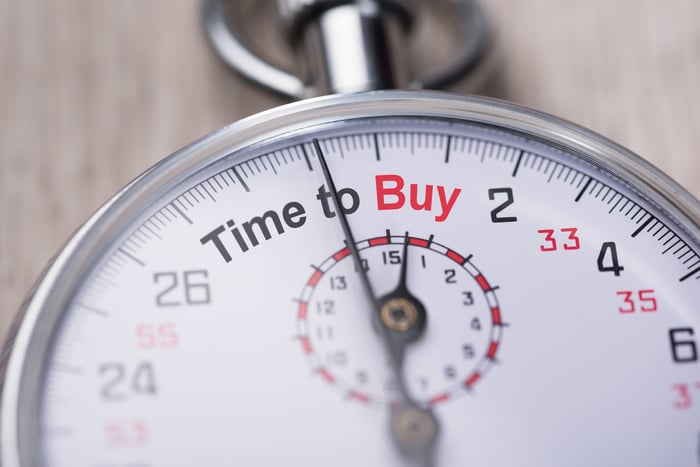Few investors have a more impressive track record than Berkshire Hathaway (BRK.A -0.28%) (BRK.B -0.68%) CEO Warren Buffett. Between 1965 and 2019, he led Berkshire to an average annual gain of 20.3%, which more than doubles the 10% average annual return of the S&P 500, inclusive of dividends paid, over the same time frame. In aggregate, Buffett has overseen a greater than 2,700,000% gain in Berkshire Hathaway's stock in 55 years.
When Warren Buffett buys or sells a stock, Wall Street and retail investors pay close attention.
However, since completing the Precision Castparts acquisition in early 2016, the Oracle of Omaha hasn't been doing a lot of buying -- at least as evidenced by the company's growing cash pile. The company's third-quarter operating results showed $145.7 billion in cash and cash equivalents in Berkshire's coffers, which is a little over $1 billion below an all-time high.
Dig a bit deeper, however, and you'll discover that Buffett has been a bit more active on the buying front than it seems. Since the beginning of 2016, he's put approximately $67 billion to work in the following three stocks.

Image source: Getty Images.
Apple: $35.3 billion
More than half of that capital has been used to scoop up shares of tech giant Apple (AAPL 1.27%), which comprises nearly half of Berkshire Hathaway's invested assets.
Buffett's company owns a little over 1 billion shares of Apple, or 5.6% of all outstanding shares after the iPhone-maker's 4-for-1 stock split. According to Berkshire's annual shareholder letter released in February, the company's cost basis on Apple is $35.287 billion. That first purchase came in the first quarter of 2016; since then, Apple has become one of the few companies that Buffett and his team have felt comfortable piling into.
Among Apple's greatest assets is its branding. Apple has become one of the most recognized brands in the world. It has an almost cult-like following, with customer lines wrapping around its stores when new devices are released.
Apple is also set to benefit from the launch of its iPhone 12 on Nov. 13. This will be the first iPhone to feature 5G connectivity. Though wireless providers are still rolling out 5G infrastructure, the first major upgrade to wireless download speeds in a decade should produce a sustainable technology upgrade cycle for businesses and consumers.
Furthermore, Berkshire's honorary "third business" is expected to see its operating margins expand as CEO Tim Cook realizes his vision. Cook has guided Apple to become more of a services and wearables company in recent years. Services can be especially lucrative given the high margins and predictable cash flow associated with subscriptions.
Through this past weekend, Berkshire Hathaway was up almost $84 billion on Apple from the company's cost basis.

Image source: Getty Images.
Bank of America: Around $10 billion
Another stock that Buffett and his team have been throwing money at on a regular basis is Bank of America (BAC -0.13%).
During the third quarter of 2017, Warren Buffett exercised his warrants on BofA and converted his company's preferred shares to common stock. When Berkshire filed its 13F with the Securities and Exchange Commission (SEC) in mid-November 2017, the company held 679 million shares.
An SEC filing made public shortly after Berkshire made a handful of third-quarter purchases shows that the company now holds north of 1.03 billion shares of Bank of America stock. Between Q3 2017 and Q3 2020, Buffett's company has added 353,852,006 shares. With BofA shares mostly hovering between $28 and $35 over those three years, and Buffett scooping up shares in recent months, I've "guesstimated" he's about $10 billion buying BofA stock over the past three years.
Why Bank of America? First, it's the most interest-sensitive of all big bank stocks. When interest rates eventually begin to rise (most likely by 2024), no money-center bank will see their interest income expand faster than BofA.
Bank of America has also cleaned up its act in a big way since the Great Recession. It has more liquidity on hand to deal with economic downturns, has vastly improved the credit quality of its loan portfolio, has successfully promoted digital engagement, and has done a good job of keeping noninterest expenses down by consolidating branches.

Berkshire Hathaway CEO Warren Buffett. Image source: The Motley Fool.
Berkshire Hathaway: Approximately $22 billion
Aside from Apple, the only stock Buffett can't get enough of is ... his own. Over the past nine quarters, Buffett and his team have repurchased about $22 billion worth of Berkshire Hathaway stock, including $9.3 billion in Q3 2020 and $15.7 billion on a year-to-date basis.
Berkshire Hathaway spent much of the past seven years valued at between 131% and 159% of its book value. The coronavirus disease 2019 (COVID-19) recession has opened the door for Buffett and his team to repurchase shares of his own company for between 115% and 130% of the company's book value. Repurchasing shares of common stock can positively affect earnings per share and can make a company look more attractive from a fundamental perspective.
On a broader scale, Buffett has aligned Berkshire Hathaway's success with that of the U.S. and global economy. He's packed the company's investment portfolio with cyclical businesses, with well over 90% of invested assets tied to technology, financials, and consumer staples. Since periods of economic expansion last considerably longer than recessions, Buffett and his team are simply playing a numbers game that they're bound to win.
With nearly $146 billion in cash still at Buffett's disposal and no true elephant deals on the horizon, don't be surprised if the Oracle of Omaha continues gobbling up Berkshire Hathaway stock.





